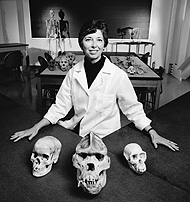![[Currents header graphic]](http://www.ucsc.edu/homeart/currents_header.gif)
![[Currents header graphic]](http://www.ucsc.edu/homeart/currents_header.gif)
October 12, 1998
Anthropologist Adrienne Zihlman has spent years trying to discover what happened in human evolution about 5 million years ago, when our ape ancestors left the forests and shaped a new way of life on the African savannas. After more than three decades, she remains fascinated by questions about how early humans lived: How did they begin to walk on two legs instead of four? What did the women do? How did women and men relate to each other, and how were the children raised?

|
|
Adrienne Zihlman, with the skulls of three primates: (l-r) a human, a lowland gorilla, and a pygmy chimpanzee
|
Come hear Zihlman, a professor at UCSC, discuss her theories about these questions and others at the annual UCSC Faculty Research Lecture on Monday, October 19, at 8 p.m. in the Music Center Recital Hall. The 1997-98 talk, delayed from the spring, is titled "An Anthropologist on Venus." It is free and open to the public.
Zihlman has earned an international reputation for her study of human evolution. Her work spans the analysis of early human fossils that have been found in Africa, the study of chimpanzee and gorilla anatomy, and the integration of DNA data that have proved that chimpanzees are our closest living relatives, with gorillas just a little more distant genetically.
Her work, which is marked by innovative thinking, enriches field observations by Jane Goodall and Dian Fossey that have revealed how "human" chimpanzees and gorillas are in their social interactions.
"Putting all the pieces of this puzzle together to re-create the life of our earliest ancestors, I have imagined myself to be a scientific visitor from another planet, observing the very beginnings of the human lineage that is having such an impact on our own planet," said Zihlman.
The Faculty Research Lecturer was established in 1967 to honor faculty members who have acquired a distinguished record in research. Recipients give a public lecture on a subject of their choice. Upon recommending Zihlman, the UCSC Academic Senate committee that nominated her commended not only her pioneering research but also the example she has set for integrating research into teaching, especially at the undergraduate level.
The committee wrote, in part, that Zihlman's "demanding standards and encouragement of students to take themselves seriously as scientists have resulted in fruitful collaborations that have extended from their undergraduate years at UCSC into graduate school and beyond."
Zihlman joined the UCSC faculty in 1967 after earning her Ph.D. at UC Berkeley. She is a fellow of the American Association for the Advancement of Science and the California Academy of Sciences, where she is on the board of trustees. She serves on the Science Advisory Committee for National Public Radio and, through the education committee of the California Academy, she shares her work and her enthusiasm about science with the public.